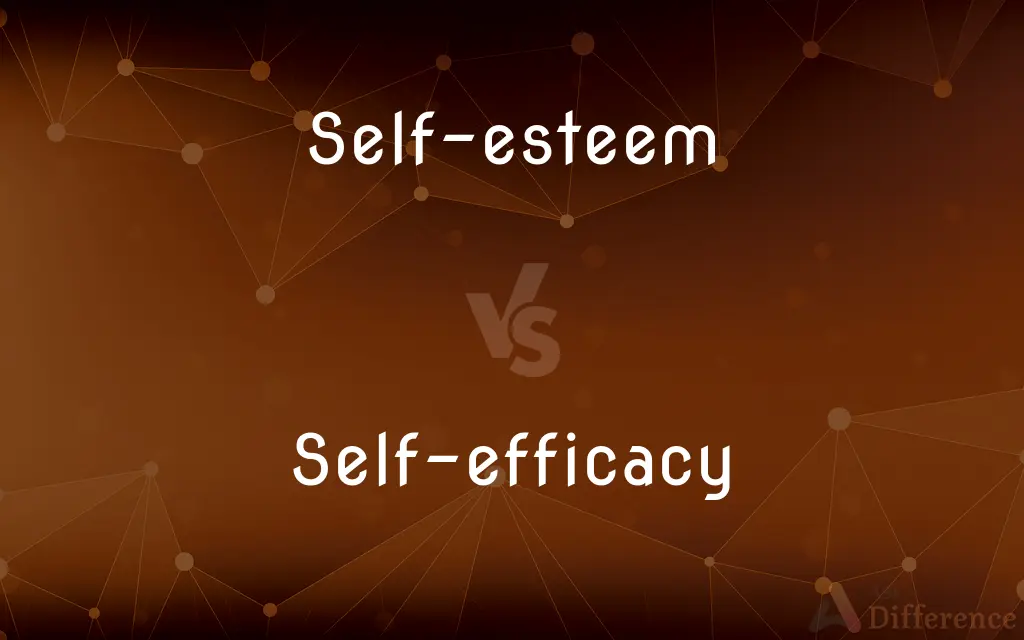Self-esteem vs. Self-efficacy — What's the Difference?
By Tayyaba Rehman — Published on November 15, 2023
Self-esteem is one's overall sense of self-worth, while self-efficacy is one's belief in their ability to achieve specific tasks. Both relate to self-perception but differ in scope and focus.

Difference Between Self-esteem and Self-efficacy
Table of Contents
ADVERTISEMENT
Key Differences
Conceptual Basis: Self-esteem reflects an individual's overall evaluation of their worth, encompassing both positive and negative feelings about oneself. Self-efficacy, on the other hand, zeroes in on one's confidence in their capabilities to produce specific performance outcomes.
Origin and Development: Self-esteem can be influenced by external validation, personal experiences, and societal norms. It evolves over a lifetime, shaped by successes, failures, and feedback. Self-efficacy is largely developed through mastery experiences, vicarious experiences (observing others), verbal persuasion, and emotional states.
Application in Life: While self-esteem might influence general attitudes about oneself, self-efficacy plays a pivotal role in task-oriented situations. For instance, believing you're a good person (self-esteem) doesn't necessarily mean you believe you can successfully run a marathon (self-efficacy).
Effect on Behavior: High self-esteem generally promotes a positive outlook on life, resilience, and a reduced vulnerability to mental health issues. High self-efficacy, in contrast, fosters persistence in challenging tasks, resilience to setbacks in specific situations, and a proactive approach to problem-solving.
Potential Fluctuations: Self-esteem tends to remain relatively stable over time, though it can fluctuate based on significant life events. Self-efficacy can vary greatly depending on the specific task at hand; one might feel high self-efficacy in one domain (like cooking) but low in another (like public speaking).
ADVERTISEMENT
Comparison Chart
Nature
General sense of self-worth
Belief in ability to complete tasks
Influences
Feedback, experiences, societal norms
Mastery experiences, observation, persuasion, emotional states
Application
Overall self-worth
Task-specific situations
Effects
General well-being, mental health
Persistence, resilience in tasks
Variability
Relatively stable, can change with life events
Varies with task/domain
Compare with Definitions
Self-esteem
A judgment of oneself as intrinsically positive or negative.
He struggled with low self-esteem after facing rejections.
Self-efficacy
Confidence in the ability to exert control over one's motivation and behavior.
Her self-efficacy in teaching made her a favorite among students.
Self-esteem
An emotional appraisal of oneself.
Encouragement from peers elevated her self-esteem.
Self-efficacy
An individual's trust in their competence to achieve a goal.
High self-efficacy drove him to tackle challenging tasks head-on.
Self-esteem
An individual's overall sense of self-worth.
Her achievements boosted her self-esteem.
Self-efficacy
Belief in one's ability to succeed in specific situations.
His successful venture increased his self-efficacy in entrepreneurship.
Self-esteem
A reflection of one's overall subjective emotional evaluation.
She radiated self-esteem and confidence at the event.
Self-efficacy
Assurance in one's capabilities to organize and execute actions.
With her self-efficacy, she led the team effectively.
Self-esteem
The evaluative aspect of the self-concept.
Therapy helped him rebuild his self-esteem.
Self-efficacy
The perceived ability to produce desired outcomes.
His self-efficacy in sales led to impressive results for the company.
Self-esteem
Pride in oneself; self-respect.
Self-efficacy
Extent or strength of one's belief in one's own ability to complete tasks and reach goals.
Self-esteem
Confidence in one's own worth; self-respect.
Self-esteem
The holding a good opinion of one's self; self-complacency.
Self-esteem
A feeling of pride in yourself
Self-esteem
The quality of being worthy of esteem or respect;
It was beneath his dignity to cheat
Showed his true dignity when under pressure
Common Curiosities
Are both innate traits?
Both are shaped over time through experiences, though some individuals might naturally have a predisposition.
Can you improve self-efficacy?
Yes, through mastery of tasks, observing others, positive feedback, and managing emotions.
Can one influence the other?
Yes, success in specific tasks (self-efficacy) can boost overall self-worth (self-esteem).
Can high self-efficacy compensate for low self-esteem?
It might in specific tasks, but overall well-being requires a healthy level of self-esteem.
What's more crucial for mental well-being?
Both are essential, but self-esteem has a more direct link to overall mental well-being.
How does societal perception affect self-esteem?
Societal norms and feedback can significantly influence one's self-esteem.
Can training improve self-efficacy?
Yes, training and mastery of skills directly influence self-efficacy.
Do self-esteem and self-efficacy always correlate?
Not necessarily; one can have high self-esteem but low self-efficacy in specific tasks and vice versa.
Can one have too much self-efficacy?
Overconfidence without skill can be problematic, leading to poor decisions.
How do educators influence students' self-esteem?
Positive feedback, support, and recognition can boost students' self-esteem.
Is self-esteem consistent across cultures?
The concept is universal, but cultural norms can shape its expression and importance.
How do challenges affect self-efficacy?
Overcoming challenges can boost self-efficacy, while repeated failures might reduce it.
Is self-efficacy task-specific?
Yes, it relates to an individual's belief in their ability in specific tasks.
Does age influence self-esteem?
Self-esteem can fluctuate at different life stages but often stabilizes in adulthood.
Are there measures to assess self-esteem and self-efficacy?
Several validated scales and questionnaires assess both constructs in various contexts.
Share Your Discovery

Previous Comparison
Protists vs. Fungi
Next Comparison
Golden Gate vs. Gibson AssemblyAuthor Spotlight
Written by
Tayyaba RehmanTayyaba Rehman is a distinguished writer, currently serving as a primary contributor to askdifference.com. As a researcher in semantics and etymology, Tayyaba's passion for the complexity of languages and their distinctions has found a perfect home on the platform. Tayyaba delves into the intricacies of language, distinguishing between commonly confused words and phrases, thereby providing clarity for readers worldwide.














































